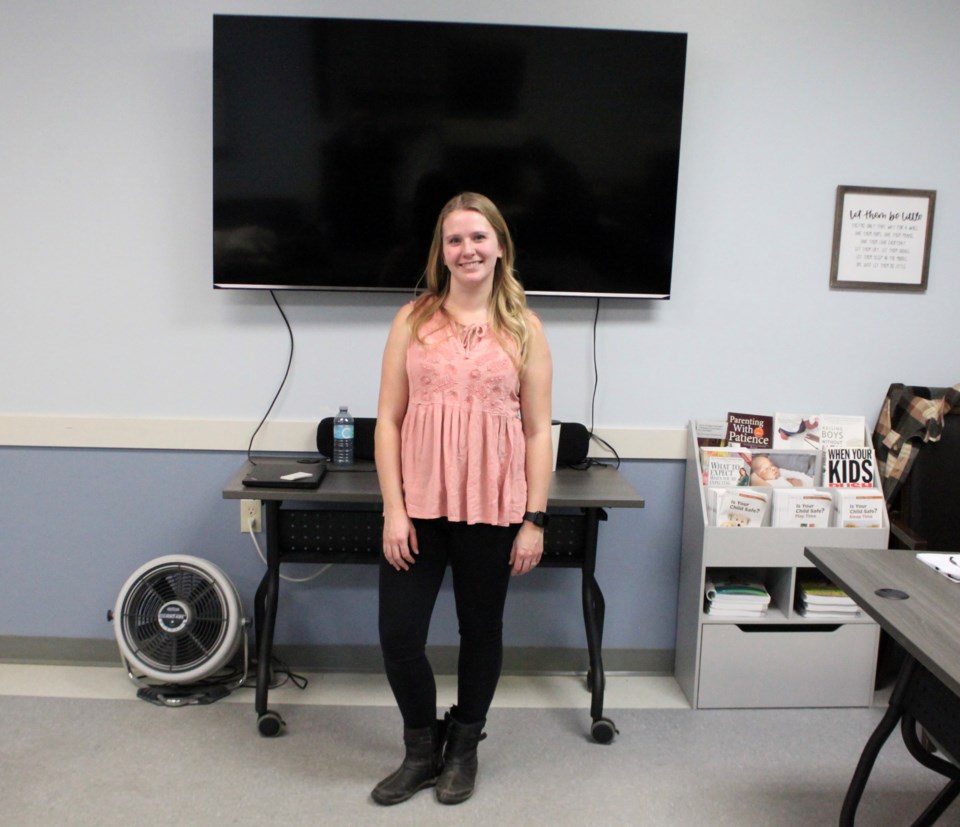BONNYVILLE – Provisional psychologist Mallory Smith brought her passion for working with neurodivergent children and youth to a presentation on ADHD at the Bonnyville FCSS.
The event was held on Jan. 8 and could be attended in person or via zoom.
Smith brought an encouraging attitude to the presentation and spoke of how difficult it is to parent in times when we are bombarded by opinions and judgments.
“I always like to say, there is no perfect parent. If that’s your goal, get a new one . . . You are a good parent. You have a great child. You are just having a hard time,” said Smith.
Smith began with covering the benefits of ADHD, including creativity, energy, compassion and willingness to help others, multi-tasking, and being goal oriented.
Smith encouraged the audience to get curious about big behaviors and offered practical strategies for working through difficult moments when the child gets overstimulated, has an outburst, or what smith calls “flipping the lid.”
“What needs and demands did they have before the behavior happened? It might have been something from the morning that set a kid off at 7 p.m. But, if we don't take the time to get curious and look at it, we miss that opportunity to learn what those needs are,” said Smith.
Smith’s recommendations are all geared towards maintaining a strong relationship, and she encourages parents to set aside at least five to 10 minutes of genuine connection with their child each day.
“When your child was first born, and they would fall asleep on you, and you know you should probably set them down, but you just can’t stop looking at their face – that's oxytocin in your body. Those are those really feel-good moments of connection. How often are you getting those with your kid?” said Smith.
Smith said the next important piece that parents can struggle with is boundary setting.
“It’s OK to set limits. It’s OK to say ‘hey, I won’t be talked to like that. When we can talk to each other calmly, then we can have this conversation . . . Boundary setting is hard.”
When boundaries are set, often Smith said that there can be an “extinction burst” when the other person is going to escalate a little bit more.
“We often say, things get a little bit worse before they get better, but that’s how we know we’re making some change,” said Smith.
Smith explained that when a child's ‘lid is flipped,’ they are past the point of communication.
Smith uses a three-step process - regulate, relate, and reason.
“When kids' lids are flipped, we want to go in and help the sensory input come down. It’s not a time to give directions and demands, it's a time to talk low, slow, and calm,” said Smith.
In these moments, Smith said it is often just about sitting with them and ridding it out, and that it’s important to understand the nuances of each child’s needs.
Once the time has been taken for their nervous system to calm down, which Smith says can take a huge range of time, it’s time to “relate,” and this is about validating the child's emotions.
“Relating is validating. [You could say] ‘hey I could see that was really hard for you . . . I could tell you were angry . . . I was also feeling that, and it wasn’t a great experience and I’m sorry,” said Smith.
Smith says to take ownership of the roles we play in the situation, as it is good role modeling.
“Being able to apologize to your kids is modeling such good skills. How many of your parents ever apologized to you? Often that’s something that hasn't been done till now, and how do you feel about repairing relationships when you didn’t have caregivers that did that for you? It sucks, right?” said Smith.
Apologizing can show that it is okay to make mistakes, and model accountability.
“It’s showing what a healthy relationship looks like. It’s rupture and repair - because rupture is inevitable in relationships, we always have conflict, but how do we repair?” said Smith.
Smith said part of relationship repair is about being able to explore both sides and then come together for a solution, which is the “reason” part of the process.
“It can give you insight into what the needs are for your child [and the] type of things that are contributing to disregulation,” said Smith.
Smith spoke about reflective listening, which includes repeating, in your child’s words, what they experienced. After, you can share what your expectations and needs were in those incidents.
“After you’ve shared your side, then you come in to collaborate on a solution . . . because that's promoting their problem-solving skills,” said Smith.
Smith encouraged a good balance of work, rest and play for the entire family.
“When do you play and have fun? When do you feel rested? . . . It's not only good for you but it’s good for your child, because they get to see what a healthy, rested, well-balanced adult looks like,” said Smith.
Smith encouraged parents to take the pressure off themselves and focus on their own mental health as well.
“Enjoy being a parent. Enjoy the life you’ve created . . . it’s OK to take a step back and take care of your mental health,” said Smith.
Smith said there is “quite a wealth of resources” in Bonnyville for those seeking help.
Bonnyville’s FCSS is one of those resources, with their ADHD Coffee Chat group, which offers support and guidance to families on the second Wednesday of each month from 7 p.m. until 8:30 p.m.
Organizer Laurie-Ann Unrau described the group as a place that “provides a supportive environment for parents to share their experiences, learn new strategies, and connect with others facing similar challenges. When there isn’t a scheduled presenter, we show evidence-based ADHS videos and provide a chance for discussion.”



